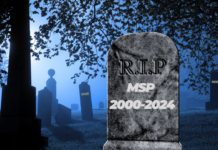Linux is shaping up as Microsoft’s target in a potential war of attrition to gain lost market share for Windows Mobile in handsets.
Microsoft’s executive in charge of leading Microsoft’s Windows Mobile group has predicted the number of operating systems for mobile handsets will be whittled down in the next three to five years and called out Linux as ripe for consolidation.
The president of Microsoft’s entertainment and devices division Robbie Bach, who presided over last year’s drop in Windows Mobile’s market share, said Linux will fall below the quality bar needed to succeed in mobile handsets.
He added Linux operating systems “won’t get the scale that they need,” saying that it’s Microsoft’s job on Windows Mobile to make sure we get that scale.”
Bach, talking to Wall Street analysts, also painted the forthcoming Windows Mobile 7.0 as something that will “move the bar forward” not in an evolutionary way “but it’s something that feels, looks, acts and performs completely different.”
Prophesying problems for Linux, Bach told analysts at last weeks’ Consumer Electronics Show in Las Vegas, Nevada: “I don’t think there’s an operator in the world that wouldn’t tell you that it’s a pain to support all the different operating systems they have, in particular the 17 versions of Linux they have on feature phones, all of which are a little quirky and a little different, require separate network certifications, network product support, and the like that goes along with that.”
He continued: “I think some of the current systems will fall away…I certainly think in the feature phone space you’ll see some pruning of the Linux tree, and I don’t think that’s really sustainable.”
You can see a full list of handsets that run Linux here.
The message was an extension of Microsoft’s strategy against Linux used on PCs and servers – that Linux needs to be integrated creating claimed total-cost-of ownership issues, while Windows comes as a complete package.
Bach was implying Windows Mobile 7.0 would save handset makers time and money spent building and customizing Linux code, as Microsoft had already done the hard work on Windows Mobile for them. Also, his implication was Windows Mobile would provide a single operating system for different handsets, simplifying their application development and support work and costs.
Otherwise, it was vintage Bach where he dwelt on the Xbox and forthcoming games, along with critical acclaim for Microsoft’s iPod imitator the Zune.
But analysts repeatedly pulled Bach back to Windows Mobile and the hit Microsoft’s taking from Apple and Research In Motion – not to mention the yet-to-be quantified impact of Google’s Android.
The exasperated Bach responded to JP Morgan’s John DiFucci’s question on Windows Mobile: “I’ve been waiting for you guys who want to talk about the good stuff for five years.”
Bach made no apologies for the Windows Mobile strategy, placing his faith instead in the ability of changes in Windows Mobile 7.0 and a Windows Phone branding campaign to wow and woo customers and regain lost market share.
According to Bach, Microsoft doesn’t have a “business-model problem, per se” or “some specific challenge outside of the fact our experience is very skewed towards business users, and it’s not as modern as it needs to be”.
For Bach, if Microsoft’s got a problem it’s been in brand awareness, where Apple and Google have been working actively. Branding, Bach appears to think, can help make Windows Phone – and Windows Mobile – exciting to non-business users along with those forthcoming changes in Windows Mobile 7.0.
“We haven’t been as engaged in the go to markets as we need to be going forward,” he said of the branding effort. This has now been fixed with the launch of the Windows Phone that’s raised awareness in the US and Europe where “we’ve actually had good success without spending a ton of money.”












